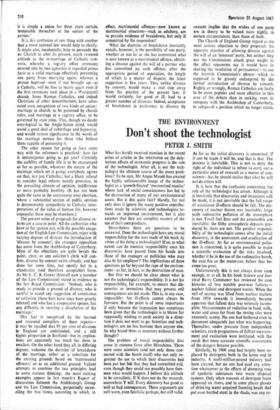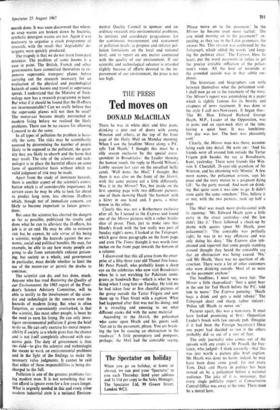Don't shoot the technologist
THE ENVIRONMENT PETER J. SMITH
What has hardly received mention in the recent series of articles in the SPECTATOR on the dele- terious effects of economic progress is the role of the technologist. After all, is not the tech- nologist the ultimate source of the many prob- lems? To be sure, Mr Angus Maude has created the highly unfavourable image of the techno- logist as a 'growth-fixated' mesmerised maniac' whose lack of social consciousness has led to the destruction of many of our environmental assets. But is this quite fair? Hardly, for not only does it ignore the many positive contribu- tions made by scientists and technologists to- wards an improved environment, but it also assumes that they are complete masters of the use of their own products.
Nevertheless there are questions to be answered. Does the technologist have any moral responsibility for the uses made of his work by virtue of his being a technologist? If so, to what extent can be exercise responsibility once his discoveries have passed from his hands into those of the manager or politician who may also be his employer? The implications of these questions go far beyond the rape of the environ- ment—as far, in fact, as the destruction of man.
But first we should be clear about what is not the technologist's responsibility. It is not his responsibility, for example, to ensure that dis- coveries or inventions that may possess evil consequences are not made. This is, in any case, impossible: for ill-effects cannot always be foreseen. But the point is of some importance if only because the impression has sometimes been given that the technologist is to blame for supposedly wishing to push society in a direc- tion it does not want to go. Scientists and tech- nologists are no less humane than anyone else. So why brand them as monsters without further thought?
The problem of moral responsibility first arose in extreme form after Hiroshima. There were some scientists (and not only those con- nected with the bomb itself) who not only re- gretted the use to which their discoveries had been put but felt that they had committed evil, even though they could not possibly have fore- seen what would happen. I believe this attitude to be unrealistic. If X does not do the research, somewhere Y will. Every discovery has good as well as bad consequences. These arguments are well worn, even fatalistic perhaps, but still valid.
As far as the initial discovery is concerned, if it can be made it will be, and that is that. The process is inevitable. This is not to deny the right of the individual to refuse to carry out a particular piece of research as a matter of con- science—but he should realise that what be will not do others will.
It is here that the confusion concerning the role of the technologist has arisen. Although it is inevitable thatdiscoveries and inventions will be made, it is not inevitable that the full range of associated ill-effects should be felt. The dis- covery of nuclear fission was inevitable; large scale radioactive pollution of the atmosphere is not. Fossil fuel fires and the automobile are inevitable; the filthy atmospheric deposits pro- duced by them are not. The positive responsi- bility of the technologist comes after the initial discovery, in the assessment and eradication of the ill-effects. As far as environmental pollu- tion is concerned, it is quite possible to make a scientific evaluation of the risks involved, whether it be in the use of the radioactive bomb, the coal fire or the motor-car, before they be- come too great.
Unfortunately this is not always done soon enough, or at all. In his book Science and Sur- vival Barry Commoner has reviewed the case histories of two notable post-war failures-- nuclear fallout and detergent wastes. When the veil of secrecy was lifted from nuclear matters from 1954 onwards it immediately became -apparent that fallout data was seriously incom- plete. Measurements of radiation in food, milk, water and areas far from the testing sites were extremely scanty. No one had bothered even to document adequately just what was happening. Thereafter, under pressure from independent scientists, crash programmes of fallout measure- ment and evaluation were instituted, with the result that more accurate scientific assessments of the dangers became possible.
Similarly, by 1960 soap had largely been re- placed by detergents both in the home and in industry. A multi-million-pound industry had been created, but no one had paid any atten- tion whatsoever to the effects of'dumping tons of synthetic substances into waste disposal systems. Only when mounds of detergent foam appeared on rivers, and in some places glasses of drinking water acquired foaming heads that put even bottled stout in the shade, was any re- search done. It was soon discovered that where- as soap wastes are broken .down by bacteria, synthetic detergent wastes are not. Again it was necessary to organise a crash programme of research, with the result that 'degradable' de- tergents were quickly produced.
The tragedy is that we do not learn from past mistakes. The problem of sonic booms is a case in point. The British, French and other governments have committed themselves to ex- pensive supersonic transport planes before carrying out the research necessary for an evaluation of the physical and psychological hazards of sonic booms and travel at supersonic speeds. I understand that the Ministry of Tech- nology now has a research programme in hand. But what if it should be found that the ill-effects are insurmountable? Can we really believe that the supersonic planes will not then be used? The motor-car became deeply entrenched in modern living before we realised the likely problems. There can be no excuse for allowing Concord to do the same.
In all types of pollution the problem is basic- ally the same. The risks may be scientifically assessed by determining the number of people likely to be exposed to the pollutant, the quan- tity they are likely to absorb and the harm that may result. The role of the scientist and tech- nologist is to place the harmful effects on some form of quantitative basis without which no valid judgment of risk may be made.
Apart from the study of imminent hazards, there is another aspect of the. scientist's contri- bution which is of considerable importance. In certain cases he may be able to look far ahead to predict long term, less obvious ill-effects which, though not of immediate concern, are likely to become important to future genera- tions.
But once the scientist has charted the dangers as far as possible, publicised the results and done what he can to alleviate the ill-effects, his job is at an end. He may be able to estimate risk but he cannot, by sole virtue of his being a scientist, weigh the hazards against the eco- nomic, social and political benefits. He may, for example, be able to say how many people are going to die from automobile exhaust poison- ing, but society as a whole, and government in particular, must decide whether to limit the use of the motor-car or permit the deaths to continue.
The scientist can do, and has done, much. Anyone who has read Restoring the Quality of our Environment, the 1965 report of the Presi- dent's Science Advisory Committee, will be able to testify to the involvement of the scien- tist and technologist in the concern over the hazards of modern living. But, what is often forgotten, or conveniently overlooked, is that the scientist, like most other people, is beset by the need to earn his living. He can only inves- tigate environmental pollution if given the brief to do so. He can only exercise his moral respon- sibility if society as a whole gives him the chance and is not itself completely obsessed with eco- nomic gain. The duty of government is thus two-fold—to give the scientist and technologist the means to work on environmental problems and in the light of the findings to make the necessary value judgments. It cannot be said that either of these responsibilities is being dis- charged to the full.
Pollution is one of the greatest problems fac- ing modern -man. It is not something that we can afford to ignore even for a few years longer. What is urgently needed in this and every other modern industrial state is a national Environ-
mental Quality Council to sponsor and co- ordinate research into environmental problems, to institute and coordinate programmes for the continuous measurement and assessment of pollution levels, to propose and enforce pol- lution limitations on the local and national level, and to report on any matter connected with the quality of our environment. If our scientific and technological advance is retarded slightly because of efforts devoted to the im- provement of our environment, the price is not too high.































 Previous page
Previous page